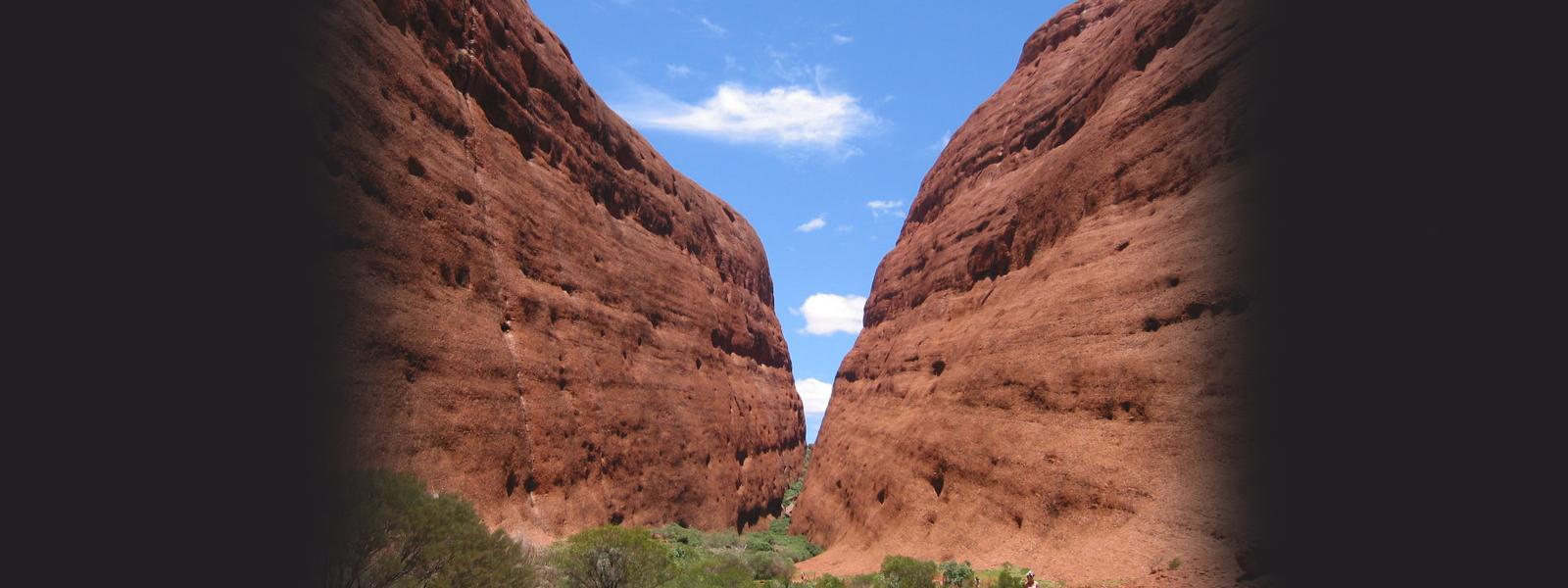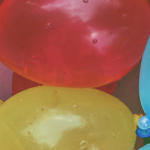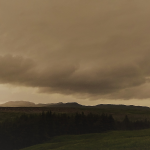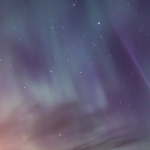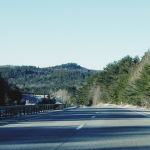‘Human beings will be happier, not when they cure cancer or get to Mars, but when they find ways to inhabit primitive communities again.’
Kurt Vonnegut
*
Sixteen miles west of Uluru, the ‘many heads’ of the Kata Tjuta rock formation rise up from the red, dusty land. The highest dome would dwarf ten Nelson’s Columns, stacked from the plinth to the crown of the admiral’s hat, and it outstrips its more famous neighbour by almost six hundred and fifty feet. The site is sacred to the male Aborigine elders of this part of Australia.
Standing in the middle of the slowly warming outback, I breathe in for a moment, and follow the rest of my tourist group down into Walpa Gorge. Looking up, I can see only the towering red rocks of Kata Tjuta, topped by a tiny sliver of early-morning blue. We walk, talking quietly, almost reverently, to our companions. My wife and two daughters are near, stifling yawns brought about by a pre-dawn start. We pause to examine the great boulders that fused together many millennia ago, giving rise to this extraordinary place. My kids touch the stones in silent awe. Then again, they could just be too tired to form coherent, audible sentences…
I feel sudden irritation at the loud gabble of a passing coach party. Then, with shame, I remember that I am the passing coach party. Our walking and wondering continues.
Returning from the passable limit of the gorge, it is suddenly quiet, the legions of other tourists have melted away, and no one, not a soul, is in sight. I feel uplifted, free; as good as I’ve ever felt. I violently inhale lungfuls of air, and savour the moment, for I know that it’s only a moment. Experience has taught me that joie de vivre comes in flashes, fleeting ultra-vivid glimpses of undiluted happiness. If you could bottle it, you’d be rich, except for the fact it’d be banned within days.
Happiness. From the same linguistic route as happenstance. In other words, luck; I am riding a wave of good fortune, here under the skies of the Southern Hemisphere.
Turning and looking up and down the long, temporarily empty path, I think about the importance of this place for the Aborigine people. You can see why they’d revere it. Walpa is a granite, basalt and sandstone cathedral built by the unpredictable turbulence of the rock-cycle; a grand edifice standing alone in this semi-arid land.
You get it, the spiritual dimension, but you can’t grasp it; you aren’t supposed to. As a modern, white European traveller standing here, you are far from the first to step on this soil, but you feel just like a pioneer. Red dust on your black canvas DMs; you are the first human on Mars.
The excited chatter of an approaching tourist group breaks the illusion of solitude. You tense; wish they’d quieten down, go away. But you are just as much an intruder here as they. Your own pious reverence doesn’t make you special, it just makes you uptight.
*
Three days later and sixteen hundred miles north west of Kata Tjuta, I sit on a bench at the Tjapukai Aboriginal Park in Cairns. I’ve spent the morning learning something of the culture of the local indigenous people, and it’s been insightful; a true privilege. No surprises, but I have discovered that I’d be a pretty useless hunter-gatherer. Abandoned in the bush by my tribe, my spear failing to fly, my boomerang returning to knock me out cold.
My journey ends with a new found respect for the way Aborigine people strive to live in harmony with their environment, and see themselves as the guardians and curators of their forests. A lesson the people of planet Earth need to learn anew, if we are to have a long-term future.
I’ve had time to think, to walk, to be in nature; all the things I lack in day to day life. Despite my many uncountable comforts and privileges, happiness remains elusive, fleeting; embalmed in ersatz, filtered Instagram moments.
Can happiness be made to last?
‘Of course not,’ we all say. ‘Grab what you can, when you can. We all know that…’
I think about my dusty boots in Walpa Gorge, the rusted grit so redolent of the fourth terrestrial planet. To walk on alien worlds, to dream of pushing out beyond the confines of our cosmic cradle, is a profoundly human instinct. Yet, I must find a way to walk with my eyes open on our own precious planet; to find a way back to the natural world that sustains us all.
Perhaps that way, if I listen to Vonnegut and follow my feet, I can learn to be lucky.
…
Biography
Adam Sear lives in Northamptonshire. When not busy earning a living teaching, he writes short stories and creative non-fiction. He is currently studying part-time for an MA in Creative Writing with the OU. His interests include: cosmology, sci-fi, history and the natural world. Strong tea, no sugar. twitter.com/Q_V_B_M

